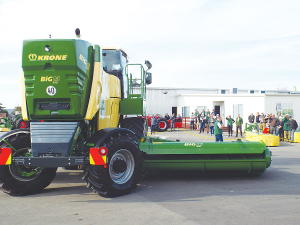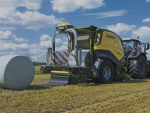Any company that has a 50-year relationship with a supplier is justified in feeling proud.
One such company, Tulloch Machines, of Masterton, recently celebrated its golden anniversary with supplier Krone, in Spelle, Germany, with a celebratory evening followed by a well-attended open day.
Both family-owned companies, who operate closely together, have the same ethos in working with dealers and end users.
The Tulloch-Krone story goes back 50 years, when Graeme Tulloch was operating a retail machinery dealership and contracting business in Wairarapa.
The machinery in use then centred on finger bar mowers and direct cut harvesters. This gear had limited output, and more critically had customers struggling with long, wet grass and poor consolidation in the stack. That led to butyric fermentation and major effluent leaching problems.
Tulloch took on the challenge to find a better system. In 1968, he travelled to the US to study wilted, fine chop harvesting systems, and he eventually imported a Gehl fine chop forage harvester. This led to increased efficiency and better consolidation but was hampered by the finger bar mowers’ inability to produce a large enough swath to make the most of the harvester output.
So the following year, on the recommendation of an American contact, Tulloch set off on a six-flight trek to Europe, a trip he remembers his secretary told him cost more than her annual salary!
Tulloch ended up in northern Germany at Spelle, the home of Krone, where he saw a new drum mower conditioner called the TM4/270. He struck a deal and despite the then Department of Trade and Industry not wanting to issue an import licence he brought the first shipment of machines to NZ.
The mo-co combined well with the Gehl fine chop machines and quickly pushed up daily outputs to 45 acres/day, a huge improvement on the more typical 15 acres/day.
Word travelled quickly about the performance of the machines and the first shipment sold out fast. A second shipment of slightly smaller machines followed, arriving without the required import licence but selling quickly before the bureaucrats got wise to them.
For 50 years Tulloch’s relationship blossomed with Krone, and Gehl, and by 1977 Tulloch commanded 60% of the NZ grass machinery market.
Tulloch grew fast and TFM Ltd in 1976 opened new premises in Masterton. By then it was also importing grassland products from JF and Mengele.
The business was sold in 1984 to AIC International (formerly International Harvester NZ) which was owned by the Australian Investment Corporation. By 1988 – and following the collapse of AIC in 1986 – the financial pressures had become too great for TFM Ltd, which went into receivership.
A new business, Tulloch Farm Imports, was set up in 1989 by Graeme and David Tulloch and this bought the assets of TFM Ltd.
Over the next two to three years the new company thrived, buoyed by a general resurgence in farming.
Graeme Tulloch retired ten years later, handing over the reins to his son John, now home from Denmark where for 13 years he had worked as an aircraft design engineer.
Today, John Tulloch remains the managing director of Tulloch Farm Machines, leading a team of dedicated and experienced employees, some of whom have spent 25 years with the company.
Things have changed a little since the first Krone TM4/270 mowers arrived. Notable new arrivals were the Big-M self-propelled mower and the Big-X self-propelled harvester with up to 1200hp. Also there are Big-Pack and Comprima, large square and round balers, Swardro 14m rotary swathers, and of course – not forgetting where it all started – an extensive range of mounted mowers in multiple configurations.



















